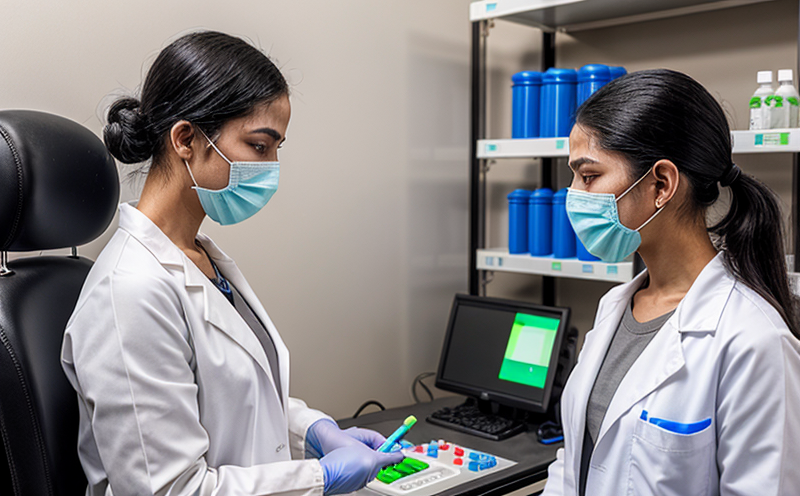Carcinogenicity p53 Knockout Mouse Testing
The p53 gene is a tumor suppressor gene that plays an essential role in preventing cancer by repairing damaged DNA, regulating the cell cycle and inducing apoptosis (programmed cell death) when DNA damage cannot be repaired. Inhibition or loss of p53 function has been shown to result in uncontrolled cell growth and tumorigenesis—a critical factor for understanding carcinogenicity.
The Carcinogenicity p53 Knockout Mouse Testing is a specialized approach designed to assess the potential genotoxic, carcinogenic, and mutagenic effects of new pharmaceuticals or chemical compounds. By using mice with a p53 knockout mutation, this method overcomes limitations associated with wild-type mice models which may not accurately reflect human cancer susceptibility due to intact p53 function.
This testing is particularly relevant for the pharmaceutical sector as it provides insights into how compounds might interact with cellular mechanisms responsible for preventing tumor formation. Understanding these interactions can lead to safer drug development practices and more effective risk management strategies during clinical trials.
At Eurolab, we use state-of-the-art facilities equipped with advanced instrumentation such as high-throughput screening systems, confocal microscopes, and flow cytometers to ensure precise analysis of cellular responses. Our experienced team ensures that all procedures adhere strictly to international standards including ISO/IEC 17025 for proficiency and accuracy.
The significance of this testing cannot be overstated; it helps pharmaceutical companies comply with regulatory requirements set forth by organizations like the European Medicines Agency (EMA), United States Food and Drug Administration (FDA), and World Health Organization (WHO). Compliance ensures that products are safe for consumers while also protecting manufacturers from potential legal challenges.
Moreover, this testing contributes significantly to public health by identifying hazards early in the development process. It enables researchers to make informed decisions about which compounds warrant further investigation or require additional safety measures before reaching market readiness.
Scope and Methodology
The Carcinogenicity p53 Knockout Mouse Testing aims at evaluating the genotoxic, carcinogenic, and mutagenic properties of chemical compounds or pharmaceuticals. This testing focuses on assessing whether these agents can damage DNA in such a way that could lead to cancer formation.
| Parameter | Description |
|---|---|
| Test Animals | Mice with a p53 knockout mutation |
| Exposure Route | Oral administration, dermal application or inhalation exposure depending on the compound's properties |
| Dosing Schedule | A standardized dosing schedule tailored to each study’s objectives and compound characteristics |
| Observation Period | A minimum of 6 months, extending up to 2 years for long-term studies |
| Evaluation Criteria | Monitoring of tumor incidence, size, multiplicity, histopathology and other relevant parameters |
The testing process involves several key steps: animal selection, compound administration, monitoring for signs of toxicity or carcinogenicity, necropsy if necessary, and comprehensive analysis of tissue samples. All procedures are conducted under strict quality control measures to ensure reliability and reproducibility.
At Eurolab, we employ rigorous protocols that align with international standards such as OECD Guideline 456 for chronic toxicity studies in rodents. These guidelines provide a framework for designing experiments that yield scientifically robust results.
Eurolab Advantages
At Eurolab, our commitment to excellence shines through every aspect of the Carcinogenicity p53 Knockout Mouse Testing. From advanced laboratory facilities and cutting-edge technology to highly skilled professionals, we offer unparalleled expertise in this specialized field.
- Precision: Utilizing sophisticated instrumentation like high-throughput screening systems ensures accurate evaluation of cellular responses.
- Consistency: Our adherence to international standards guarantees consistent and reliable results across multiple studies.
- Compliance: Ensuring full compliance with regulatory requirements helps pharmaceutical companies navigate complex legal landscapes smoothly.
- Efficiency: Streamlined workflows minimize delays, allowing for faster turnaround times without compromising quality.
In addition to these technical advantages, Eurolab also offers personalized service tailored to each client’s specific needs. Our dedicated team is always available to provide guidance and support throughout the testing process, ensuring that clients receive comprehensive information about their results.
Why Choose This Test
The Carcinogenicity p53 Knockout Mouse Testing offers several compelling reasons why it should be your preferred choice for assessing the safety of new pharmaceuticals or chemical compounds. Here are some key benefits:
- Informed Decision-Making: By identifying potential risks early in development, companies can make more informed decisions about which compounds to pursue further.
- Rapid Regulatory Compliance: Ensuring full compliance with global regulations streamlines the drug approval process and reduces time-to-market.
- Patient Safety: Identifying hazards before they reach clinical trial stages contributes significantly to public health by minimizing exposure risks for consumers.
- Innovation: Understanding how compounds interact with critical cellular mechanisms fosters innovation in safer drug design.
Choosing Eurolab means partnering with an industry leader committed to delivering top-tier services. Our reputation for quality and reliability has earned us a strong position within the pharmaceutical testing market, making us your ideal choice for this specialized service.





